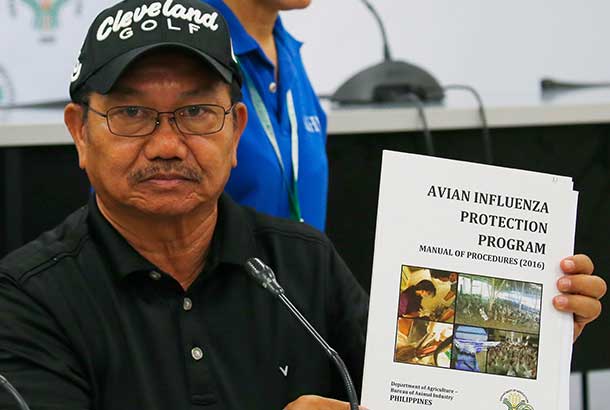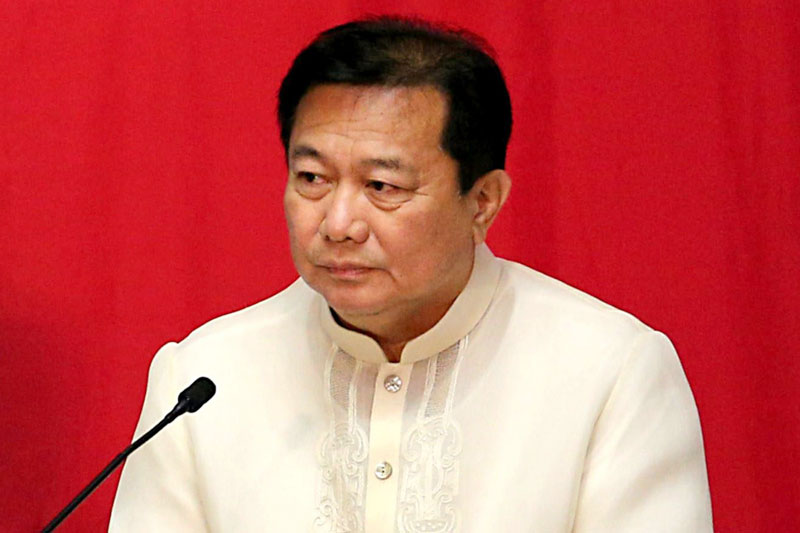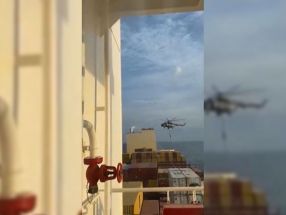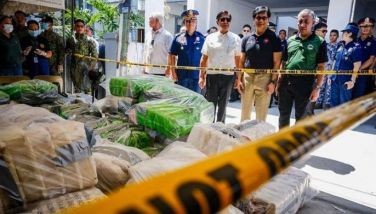Avian flu poultry ban partially lifted

Agriculture Secretary Emmanuel Piñol yesterday signed an administrative order lifting the ban following assurances from biosecurity experts that transporting poultry products from Luzon to other parts of the country is now safe. AP Photo/Bullit Marquez, File
MANILA, Philippines - Despite the unfinished task of eliminating avian flu, the government has lifted its ban on the transport and shipment of poultry and poultry products nationwide.
Agriculture Secretary Emmanuel Piñol yesterday signed an administrative order lifting the ban following assurances from biosecurity experts that transporting poultry products from Luzon to other parts of the country is now safe.
The ban, however, stays for poultry products from avian flu “ground zero” in San Luis in Pampanga, and from Jaen and San Isidro in Nueva Ecija.
The ban, first imposed last Aug. 11, was a precautionary measure to contain the virus and prevent it from infecting humans.
The country’s first avian flu case was reported in San Luis in Pampanga.
“We made the decision to lift the ban based on recommendations that it is now safe to do that. We believe that we have already contained the virus,” Piñol said.
He stressed some restrictions remain despite the lifting of the ban.
“Any shipment to be made must be validated by our quarantine officers and must carry certification that this came from accredited and inspected farms in Luzon. Products must carry the seal of the quarantine officers,” he said.
The poultry industry had been urging the Department of Agriculture (DA) to lift the ban, citing billions of losses due to poor sales.
“The more emotional consideration is that we also have to listen to the pleadings of the farmers. We have to look at the welfare of the industry,” Piñol said.
The DA chief emphasized he was not giving in to pressures from the industry, and that he was heeding experts’ advice.
“Beyond the emotional consideration, our first priority is the biosecurity. They (experts) assured me that it is OK to lift the ban. The industry can pressure me for as long as they want, but if the experts said it cannot be, then I would not have allowed it,” he said.
Authorities had expected the ban to last until mid-September or even later with the spread of the virus to Nueva Vizcaya.
With the overall lifting of the ban, industry players said they expect gradual recovery within the next few weeks.
“Hopefully, confidence will be restored in poultry products and we will move forward. It’s been a rough period since Aug. 11. This is a critical turn and we are reversing the downtrend,” said United Broiler Raisers Association (UBRA) president Elias Jose Inciong.
“Recovery in the sense that prices will be near cost to production, not necessarily with profits. Those who store their chickens in the cold storage facilities will be able to move their products. We will still be losing money, but at least there is hope already,” he added.
Farm gate prices have slumped to P10 to P15 per kilogram, way below cost of production, from the average of P70 per kilogram.
Industry estimates that it is losing approximately P179 million per day, reaching P2.3 billion as of today.
LGUs alerted
Piñol said he would coordinate with the Department of the Interior and Local Government to ease the shipment of the products after the industry expressed fears that local government units (LGUs) might still restrict transport despite the new order.
“Everybody will be informed. We will coordinate with them and urge LGUs to abide by our directives,” he added.
The DA will also coordinate with the Department of Social Welfare and Development (DSWD) for the possible delivery of excess chickens in cold storage facilities to evacuees in war-torn Marawi.
“Our proposal is that instead of DSWD giving canned goods to the evacuees, why not chickens? Besides, those will be halal-certified. I will recommend this to the President, hopefully DSWD funds will be used to also help the industry,” Piñol said.
The DA chief maintained that there would be no importation anytime soon as there is enough supply to fill up the total volume of poultry heads culled.
“We told the processors to not import and instead use local chicken,” Piñol said.
“The supply is not a problem even before the announcement of the bird flu. It would not make sense to import at this time,” Inciong added.
Meanwhile, experts are still tracing the source of the virus. “We are just about to start determining the source. Experts from FAO (Food and Agriculture Organization) and OIE (World Organization for Animal Health) are now here to help us trace,” Arlene Vytiaco, head of Bureau of Animal Industry’s animal disease and control division, said.
DA earlier suspected the virus may have come from either migratory birds or smuggled Peking ducks from China.
Initial laboratory test from Australia, meanwhile, confirmed that it was indeed bird flu but it did not indicate which strain or whether it was transmissible to humans.
“We will await one to three more days before we get the results from Australia,” Vytiaco said.
Unprepared
In a television interview, Sen. Cynthia Villar lamented the bird flu outbreak in Pampanga has only proven the government’s unpreparedness for the contagion.
Villar, chair of the Senate committee on agriculture, said she would conduct an inquiry to determine the preparedness and capability of the government in dealing with disease outbreak.
“I want them (DA) to do their work first then maybe after we have solved this problem, then we can talk in a committee hearing to see that it will not happen again – more like prevention for the second time and being prepared in case it will happen again,” the senator told ANC.
She said there appeared to be “lack of education” among the poultry-raisers and the general public in dealing with a bird flu outbreak.
“They (poultry farmers) don’t know what to do. They couldn’t sell them. I told them to dress them and put it in the freezer and you sell it again after all this has come to pass,” Villar said.
She said the DA followed international protocols in culling live fowl in the towns where the outbreak happened.
However, when it comes to other poultry products, like dressed chickens, chicks and eggs, the procedures must be different.
“They have different products so we have to follow different protocols to minimize the damage to the industry,” she said.
It appeared, she added, the provincial and municipal agriculturists have a “lack of knowledge” on dealing with the outbreak.
“Maybe we can do something that these provincial agriculturists and town agriculturists will be more proactive. One of their problems is if the governor or the mayor is not really that interested in agriculture, they don’t have any budget,” Villar said.
She recommended that LGUs allocate a certain percentage of their budgets to agriculture. – With Paolo Romero
- Latest
- Trending





























